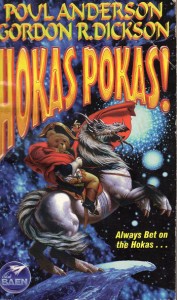Book Review: Hokas Pokas! by Poul Anderson & Gordon R. Dickson
The Hoka of the planet Toka are the galaxy’s best live-action roleplayers. Given a story they find interesting, the teddy-bear-looking aliens will take on the characters as their own personalities. And they especially love Earth stories. Thus it is that they have entire subcultures based around Sherlock Holmes, or the pop culture version of Napoleon or the Lord of the Rings novels. Alexander Jones, Ambassador Plenipotentiary of the Interbeing League, has his hands full trying to keep the Hoka safe until they’re considered advanced enough to join galactic civilization.
The Hoka stories are comedic science fiction; some of the funniest ever written. This volume contains three of those stories.
“Full Pack (Hokas Wild)” gives Alexander Jones’ wife, Tanni, a rare day in the limelight. While her husband is away, Tanni goes to investigate a downed starcraft, along with her young son Alex Jr. It’s in the Hoka version of India, which is based more on Rudyard Kipling books than on the Mahabhrata. The mission is complicated when her Hoka escort overnight switches from a British military regiment to a wolf pack from The Jungle Book. Yet those who are familiar with the book rather than the Disney movie may catch on to the twist more quickly than Tanni does.
“The Napoleon Crime” explains where Alexander Jones was during the previous story, on Earth negotiating for an upgrade in the Hokas’ status. But back on Toka, someone or something has been twisting the Hoka games, and the planet is on the brink of having actual wars. With the aid of the heavyworld free trader Brob, Alex must return to Toka unannounced and go undercover as Horatio Hornblower to head off a deadly reenactment of the Napoleonic Wars.
Star Prince Charlie moves the setting to the world of New Lemuria, and the archipelago kingdom of Talyina. This feudal society has been contacted by the Interbeing League, which hopes to eventually bring the Lemurians up to galactic standards with the minimum of outside interference. Talyina is visited by young Charles Edward Stuart and his Hoka tutor, taking a vacation from the cargo ship of Charlie’s father.
There’s trouble in Talyina, though. The current king is a usurper and tyrant, and the people grumble. One drunken night for the tutor and a local warrior later, a prophecy about a destined prince and the tradition of the Young Pretender cast Mr. Stuart in the role of Bonnie Prince Charlie, and the Hoka is now his Highland Scots retainer, Hector MacGregor. A local lord is pushing Charlie to fulfill the prophecy, and due to the League rules, the boy can’t just have technologically advanced guards come get him.
The prophecy begins to come true, with a little “help”, and the people rally behind their alien prince. But as events sweep Charlie along, he comes to realize that overthrowing one tyrant may only lead to a worse one taking the throne. For the sake of Talyina, he must become the hero they deserve, if not the one they think he is.
This is actually a short novel, written for the young adult market. It’s very much a boys’ adventure in the spirit of Robert Louis Stevenson, with rather more humor. (All the chapter titles are literary references, for example.) Charlie moves in a world of men; women are mentioned from time to time, but none are important to the plot, and I cannot remember Charlie ever having a conversation with one. He does, however, learn not to look down on people just because they’re less educated or technologically advanced. The bittersweet ending demonstrates how much he’s grown as Charlie chooses to do the right thing rather than the easy thing.
There’s some college papers waiting to be written about colonialism and cultural appropriation in the Hoka stories–much of the humor derives from the latter being turned on its head, and the League tries to avoid the worst effects of the former, but those things are worth considering.
While the first two parts are not specifically written for young adults, they should be okay for junior high students on up. Some references are likely to go over the heads of younger readers, which makes this a good choice for re-reading later. Highly recommended to fans of science fiction humor.

